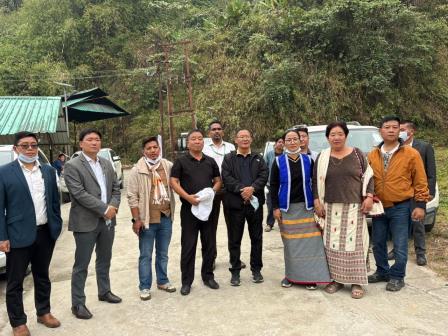-
COPU reviews state PSUs in second sitting
-
CM stresses on strong internal security, tech-driven policing
-
Cabinet approves proposals aimed at strengthening governance, enhancing public…
-
Body found hanging at bus stop with limbs tied sparks…
-
Mein chairs pre-budget consultative meeting with community based organisations
-
District level training on Census of India 2027 begins at…
-
WCD Minister reiterates commitment to safeguarding rights, dignity of…
-
Woman loses life in massive fire, two children seriously injured
-
 UA Minister inspects burial ground, focuses on maintenance and improvement
UA Minister inspects burial ground, focuses on maintenance and improvement
-
 UA Minister inspects burial ground, focuses on maintenance and improvement
UA Minister inspects burial ground, focuses on maintenance and improvement
It was definitely a manic Monday, as the state capital’s streets were in utter chaos as the Itanagar Traffic Wardens staged a whistle down strike. Earlier, in January this year, similar scenes were witnessed when the ITWs launched a long 11-plus days of strike demanding redressal of their many demands.
The streets of the capital complex looks incomplete and a tad disarrayed without the ‘white & navy uniformed’ traffic personnel more popularly known as the Itanagar Traffic Wardens who have become a prominent fixture on the city’s roads. Managing traffic here is no mean feat. In a place where breaking rules, risky overtaking manoeuvres, haphazard parking, underage driving is a fad, the deployment of the Itanagar traffic wardens at important locations for proper management of traffic sometime in 2013 has been a welcome development. The move certainly helped in reducing traffic congestion during peak hours and instilled confidence among road users.
To be fair, a traffic wardens job is far from easy; requiring them to stand for hours together under the scorching sun or brave unfriendly weather conditions. Hours of prolonged standing at busy traffic intersections along with being exposed to environmental pollution means that they are surrounded by significant health threats.
Given the steady increase in number of vehicles which is the norm given Itanagar’s status as the capital, traffic management will become an even more pressing problem for the administration. An important aspect which needs to be kept in mind is the fact that number of cars is growing but the roads have hardly much scope for expansion. The winding narrow roads and the lack of alternate routes is already making traffic management woes more pronounced.
Not getting into the nitty-gritty of recruitment procedures or otherwise, the current impasse must be bridged in public interest. The authorities and the agitating ITWs must sit down for a dialogue and try to iron out the differences.
Unlike other ad hoc jobs created, the ITWs actually serve an important purpose. It goes without saying that the requirement and dependence on traffic management personnel will become indispensable in the near future.

Kenter Joya Riba
(Managing Editor)She is a graduate in Science with post graduation in Sociology from University of Pune. She has been in the media industry for nearly a decade. Before turning to print business, she has been associated with radio and television.
Email: kenterjoyaz@easternsentinel.in / editoreasternsentinel@gmail.com
Phone: 0360-2212313

